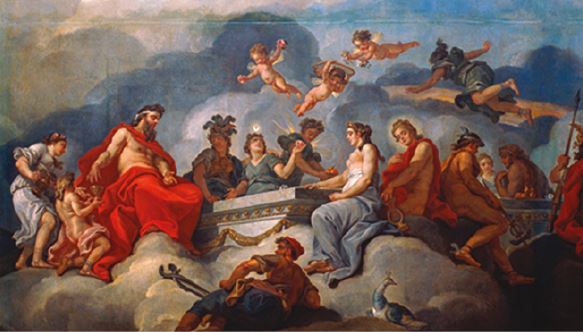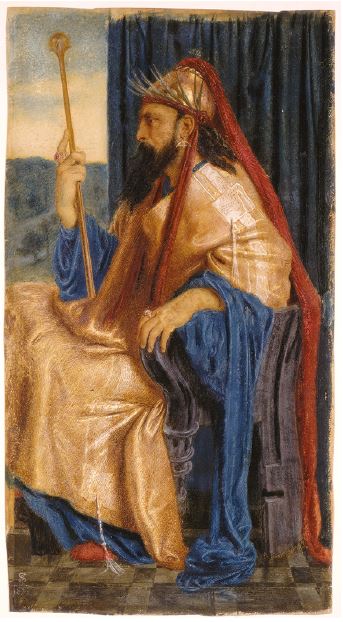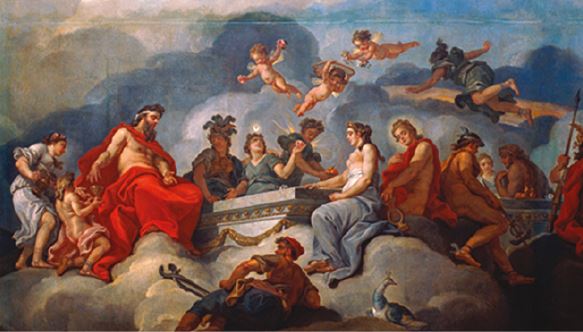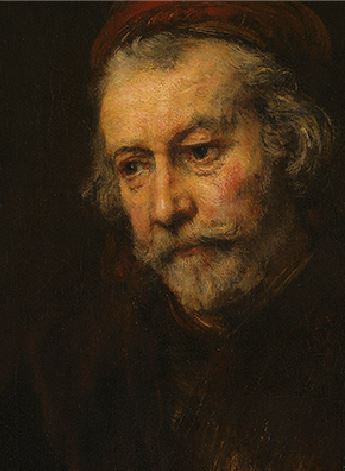SOONER OR LATER each of us must ask ourselves—does life have a purpose?
Some conclude that life is just an accident; that history is a tale told by an idiot; the only golden rule is “do to others before they do to you!” Morality is then simply a question of “Let us eat and drink, for tomorrow we die!” (as the Bible succinctly puts it in Isaiah 22:13). There are many people who profess this view as the purpose of life, but it strikes me as a shallow and unreflective answer. It’s actually preached more often than consistently followed, because its adherents are usually quick to talk about ‘justice!’ and ‘fair play!’ and ‘my rights!’ when they feel themselves to be hard done by—as though the moral standards which do not apply to them should nevertheless apply to others.
Humanism
A more thoughtful answer to our question is the ‘humanist’ approach. According to this mode of thought, life may or may not have originated by accident, but whether it did or not, the only purpose shaping our life is the human purpose. We determine our own values and ideals, and we fix our own goals. There is therefore no absolute standard of morality.
Many humanists dedicate their lives to helping and benefiting others. Some do an enormous amount of practical good; others contribute to knowledge in which others can share for the good of humanity.
Humanism is widely prevalent and has replaced Christianity in many countries of the world. But I believe it is a fundamentally mistaken view, and in the final analysis it is unsatisfactory and unfulfilling. To illustrate this I want to share with you the writings of a man who, we might say, examined the humanist approach to life.
For what happens to the sons of men also happens to animals; one thing befalls them: as one dies, so dies the other. Surely, they all have one breath; man has no advantage over animals, for all is vanity. All go to one place: all are from the dust, and all return to dust. Who knows the spirit of the sons of men, which goes upward, and the spirit of the animal, which goes down to the earth?
(Ecclesiastes 3:19–21).
I would recommend you read the first three chapters of the Bible book of Ecclesiastes at your leisure to find out more.
The writer was probably King Solomon, son of King David, who reigned in the 10th Century bc. Here is a thoughtful man. A man who put wisdom first; who tried everything this world has to offer; whose life was crowned by one achievement upon another. His record in history is impressive by any measure. And yet, what does he feel about this? What satisfaction does it bring him? His conclusion: “Then I looked on all the works that my hands had done and on the labour in which I had toiled; and indeed all was vanity and grasping for the wind. There was no profit under the sun” (Ecclesiastes 2:11).
However brilliant you may be, however distinguished your career, however much of a public servant, however many honours have been heaped upon you, you will perish as surely as any animal. Some people are instantly forgotten, some leave their mark on history. And yet, “That which has been is what will be, that which is done is what will be done, and there is nothing new under the sun” (Ecclesiastes 1:9).
Christianity
What then is the Christian view? I want to compare this with the humanist view. Let’s start right at the beginning. The Bible insists that we are not here by accident. It begins with the story of creation brilliantly unfolding before our eyes. At its climax:
Then God said, “Let Us make man in Our image, according to Our likeness; let them have dominion over the fish of the sea, over the birds of the air, and over the cattle, over all the earth and over every creeping thing that creeps on the earth.” So God created man in His own image; in the image of God He created him; male and female He created them
(Genesis 1:26–27).
These are deceptively simple words, but their importance is profound. The first thing we read is that God decided to make man in His own image and in His likeness. But what does this mean? I suggest this has less to do with the physical attributes, and is rather referring to what we call the intellectual and spiritual faculties that human beings possess. The fact that we have a rational and moral mind makes a reasonable case to assert that humans are made in the image of God.
The natural progress of this idea is the question: how are we to develop these faculties which God has given us, in order to show that we are made in His image?
God’s Revelation
My answer is that God is revealed through His word, the Bible. I hope what I mean by this becomes clear as we go on. He reveals His purpose, which no one can thwart, which is to fill the whole earth with goodness (for example Numbers 14:21, Habakkuk 2:12–14). But also God reveals Himself—His essence, if you will. He reveals to us something of His own nature. And if we are indeed in the image of God it is vital that we explore the ways that we can grasp this concept, because only by doing this will we realise our own true nature.
Perhaps the most distinctive feature of the religion of the Bible is how different it is from the contemporary religions of say, Babylon, Egypt, Greece or Rome. You may well be aware that the pagan gods of old were a pretty disreputable shower. You wouldn’t want them as neighbours, let alone supreme beings. They argued, they rioted and cavorted, they got drunk and had fisticuffs with each other. In short they tended to behave like selfish and immature humans rather than all-powerful deities.
Contrast this with the God of Israel: “And the Lord spoke to Moses, saying, ‘Speak to all the congregation of the children of Israel, and say to them: “You shall be holy, for I the LORD your God am holy”’” (Leviticus 19:1–2). God is totally opposite from sin. He cannot lie. He calls upon each of us to be truly good. In other words what God is, in His innermost being, is what human beings can become —holy.
Holiness
You may say that is all very well but what does it mean in practice? Leviticus 19 goes on to illustrate the answer, particularly in verses 9–18 and 32–37 where God tells Israel to show an unpatronizing care for the poor and refugee, and to treat their family and neighbours with respect.
This is an example of how the concept of holiness is translated into daily living. At every stage, and after almost every command come the words “I am the Lord”. In telling us to do good, He is telling us to reflect His nature.
Does this leave you with a feeling of inadequacy? Do you not believe that you can be ‘holy’? Don’t worry! God knows what we are capable of, but He also knows that we have a problem. We need now to consider the man who is at the very centre of God’s purpose—His Son Jesus Christ.
John’s Gospel introduces Jesus: “And the Word became flesh and dwelt among us, and we beheld his glory, the glory as of the only begotten of the Father, full of grace and truth” (John 1:14). The Word of God, by which He created the world (Genesis 1:3), which speaks to us in the pages of the Bible, revealing not only God’s purpose but primarily His inmost nature, was perfectly revealed in the person of Jesus Christ. And so for the first time the glory of God, the very image of God’s own nature, was made clearly intelligible to human beings. When you look into the face of Jesus Christ, you see there the glory of God himself.
God, Who at various times and in various ways spoke in time past to the fathers by the prophets, has in these last days spoken to us by His Son, whom He has appointed heir of all things, through whom also He made the worlds; who being the brightness of His glory and the express image of His person, and upholding all things by the word of His power, when he had by himself purged our sins, sat down at the right hand of the Majesty on high, having become so much better than the angels, as he has by inheritance obtained a more excellent name than they
(Hebrews 1:1–4).
The writer here shows us the majesty of Jesus Christ—the brightness of God’s glory and the express image of His person. And what does it mean for us? By his sinless life and his death as a sacrifice, he ‘purged our sins’. We do well to feel inadequate, we cannot be ‘holy’ by our own merits. But if we take advantage of the forgiveness which Christ has secured, we can be made holy by him (Colossians 1:14).
Life With A Purpose
Jesus said to his disciples, “If anyone desires to come after me, let him deny himself, and take up his cross, and follow me. For whoever desires to save his life will lose it, but whoever loses his life for my sake will find it” (Matthew 16:24–25). This is the opposite of the humanists’ concept of life as a way of achieving self-realization and self-fulfilment. Christianity involves submitting yourself to God, so that you become ever more like Him in your attitude, thinking and behaviour.
The cross is, of course, the torture implement on which Jesus died (Matthew 27:32). Time and again in the Bible we see discipleship described with the language of sacrifice. This is how the Apostle Paul described his own life: “I have been crucified with Christ; it is no longer I who live, but Christ lives in me; and the life which I now live in the flesh I live by faith in the Son of God, who loved me and gave himself for me” (Galatians 2:20).
This is what gave Paul’s life its essence and its goal. And in contrast to the humanist view, the goal of his life extended beyond his mere mortal existence, to the everlasting Kingdom which Christ will establish at his return: “Finally, there is laid up for me the crown of righteousness, which the Lord, the righteous Judge, will give to me on that Day, and not to me only but also to all who have loved His appearing”
(2 Timothy 4:8).
This is the purpose of life!
Malcolm Cross (based on a talk by Gordon Hunnings)





